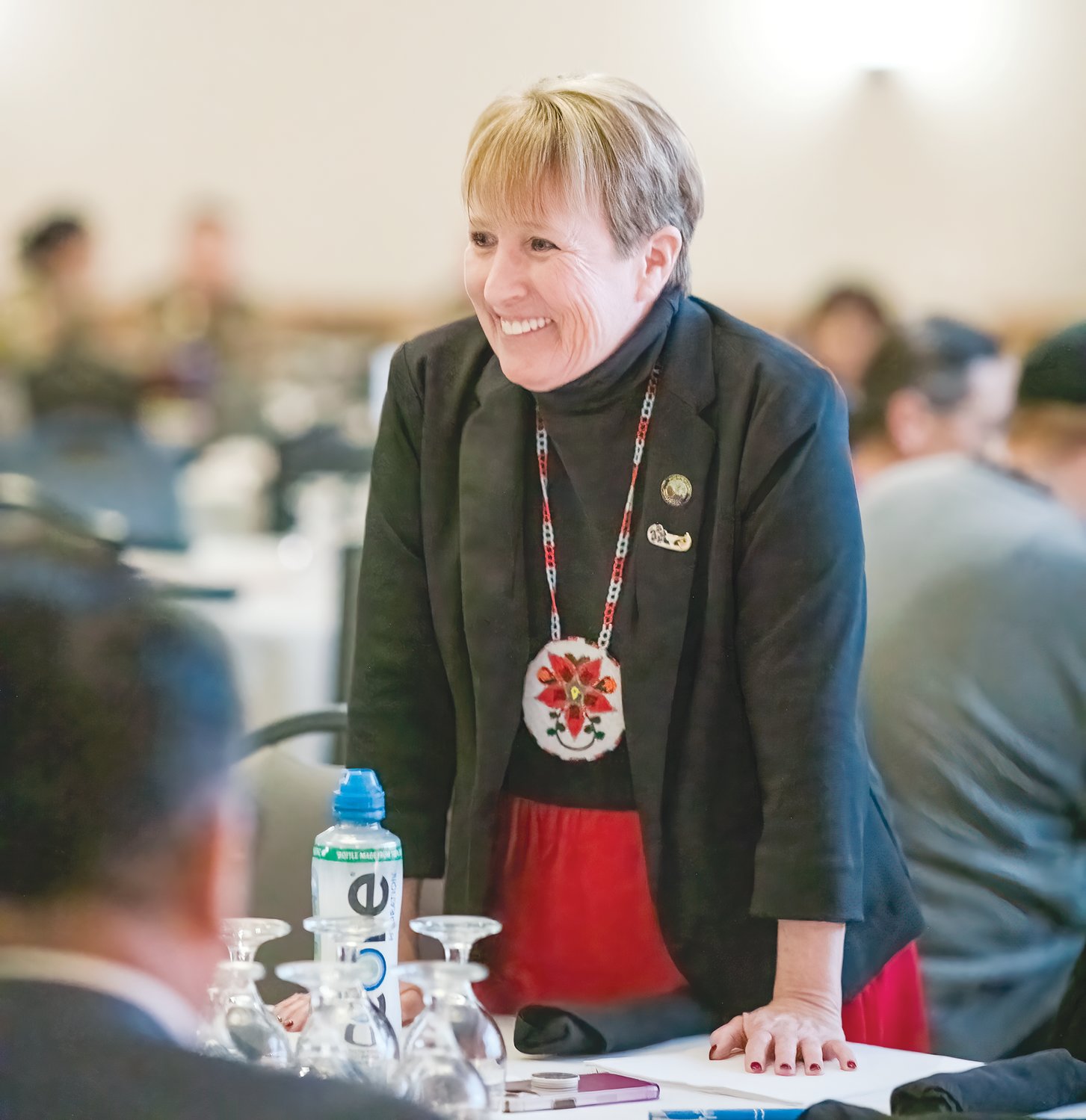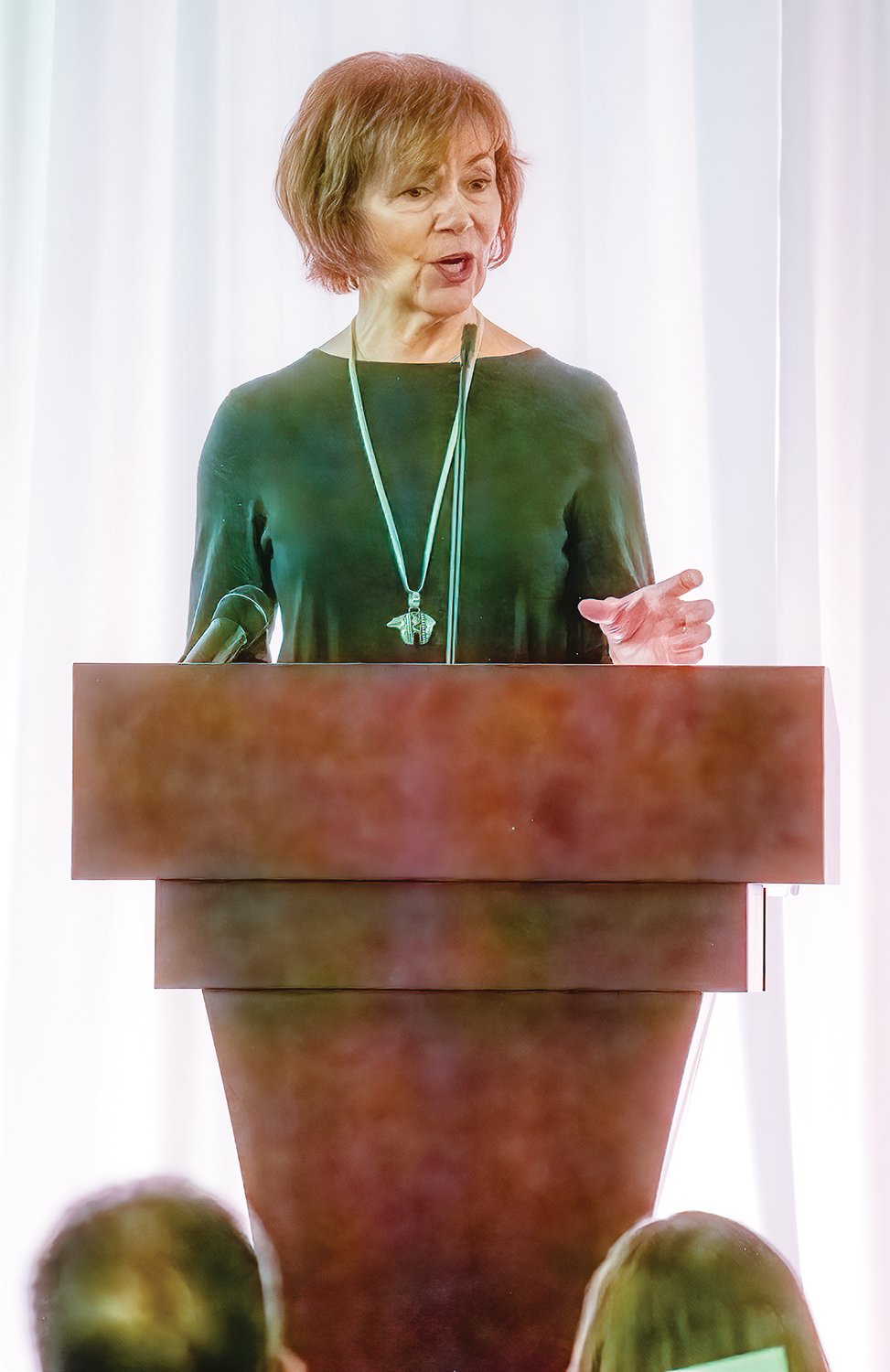Support the Timberjay by making a donation.
Bois Forte gathers for State of the Band celebration
Event returns to Fortune Bay after two-year COVID hiatus
VERMILION RESERVATION- The ballroom at Fortune Bay Resort Casino on Thursday, Jan. 19 was packed with Bois Forte Band members attending the annual State of the Band festivities, a most welcome change …
This item is available in full to subscribers.
Attention subscribers
To continue reading, you will need to either log in to your subscriber account, below, or purchase a new subscription.
Please log in to continue |
Bois Forte gathers for State of the Band celebration
Event returns to Fortune Bay after two-year COVID hiatus
VERMILION RESERVATION- The ballroom at Fortune Bay Resort Casino on Thursday, Jan. 19 was packed with Bois Forte Band members attending the annual State of the Band festivities, a most welcome change from the past two years when COVID-19 prevented the gathering.
And no one was happier to be back together in person than Tribal Chairwoman Cathy Chavers.
“The turnout tonight is just overwhelming and tremendous, because we haven’t done this for two years,” Chavers said. “It’s taken away from our culture, in a way, by not being able to gather and be together. By having everybody here tonight together, it’s just overwhelming and it warms my heart so much to see. It’s nice to hear the laughter, the talking, everybody talking about good times, bad times. This is wonderful.”
Minnesota U.S. Sen. Tina Smith attended the event and spoke to the assembly about important accomplishments in Washington, D.C. that have benefitted the Band.
“Over these last two years, Congress, along with President Biden, has done remarkable work,” she said. “I’m very, very proud of historic investments in tribal nations, beginning with the work on roads and infrastructure and broadband.”
Smith noted support for tribal colleges, drinking water, traditional infrastructure like roads and bridges, for climate resilience, and also what she called “the highest ever funding for needed housing.”
Smith also talked about how Congress has bolstered the Indian Health Service, a long underfunded program relative to the need.
“This year, we were able to increase funding for the Indian Health Service, and for the first time ever, we were able to treat Indian Health Service just like we treat other crucial federal government agencies like Social Security and Medicaid by making sure that if there’s a disruption in the federal government’s work, that Indian Health Service will have advanced appropriations so that your work will not be interrupted,” she said.
Smith also noted the upcoming work on the 2023 Farm Bill.
“What does that have to do with the work here in Bois Forte? Well, I will be working hard to make sure that the rural economic development parts of that bill reflect the needs of tribal nations, that Native farmers have an opportunity to participate in the programs of the U.S. Department of Agriculture. And most importantly, I think we understand that food is medicine, and it is essential that tribes should have the power to run your nutrition assistance programs.”
Smith got the biggest response from the crowd when she talked about protecting the Band’s wild rice.
“Manoomin is your way of life,” Smith said. “It is important that we do not allow producers of wild rice in other places in the country to claim wild rice as an Indigenous product and do that with the help and support of the federal government. I will fight against that with everything that I have.”
Chavers said she was gratified that Smith arranged her schedule to attend.
“Sen. Smith and I have been friends for years,” she said. “I really admire her and her leadership, and to have her here tonight was just kind of icing on the cake. It’s not very often you get a senator to come to your state of the band.”
Chavers opened her remarks by commending the work of frontline workers and health care and emergency personnel during the COVID pandemic.
“COVID-19 and the term pandemic are somewhat behind us,” she said. “However, it is still and always will be there, like the flu. I want to acknowledge that everyone at Bois Forte, along with the other ten tribes in Minnesota, led the way in many aspects of battling this pandemic. When I say led the way, state and federal officials have seen and acknowledged what the tribes have done better when tasked to do so. We all protected our communities, our elders, our children and those with underlying health conditions. But we also helped out our neighboring communities.”
Chavers noted that the Band has increased opportunities to influence decision-making at state and federal levels after the passage of laws mandating consultation with tribes before decisions are made.
“It’s getting the tribe a seat at every table before these important decisions are made,” Chavers said. ”It’s also giving us tremendous opportunity as tribes to move forward in a very positive way and productive way. Many of you may not believe this, but tribal leaders have never been so busy, or meeting so much, since tribal consultation has come forward.”
Chavers talked about the benefit of American Rescue Plan funds in securing the services of Native-owned consultant Blue Stone Strategy Partners to help identify all the funding sources available to the Band and to work on leadership and planning activities.
One key initiative the Band needs to address is how its aging population will affect potential development activities, Chavers said.
“Our workforce is aging, and we need people to work,” she said.
Chavers noted that adult tribal members received $3,200 economic relief payments. In addition, she said the Band has implemented two emergency rental assistance programs and is developing a Bois Forte Homeowners Assistance Fund to help Band members who are struggling with late payments, insurance, and taxes. A Small Business Loan Program will soon be available to Band members and their descendants, she said.
The Band received $29 million from the federal government through the CARES Act and the American Rescue Plan, and 52 percent of that money, $15 million, has been invested “to ensure that we are looking forward to not only our current tribal members’ needs but also the next seven generations to come,” Chavers said.
ARPA funds were also used to jumpstart the replacement of the damaged Nett Lake Dam.
“We were at a crisis stage hoping our dam would not break and then lose our water and our rice in Nett Lake forever,” Chavers said.
High water levels decimated last season’s rice crop, forcing a difficult but necessary decision to cancel the ricing season, Chavers noted.
The Band has received approximately $80 million in grant funding, Chavers said, and she highlighted some of the significant projects, such as the $19.8 million for broadband development not only for reservation land but for land adjacent to reservation boundaries, and a $9 million grant to build a new transit facility.
Bois Forte is one of three tribes selected to participate in a pilot project to assess and upgrade its finance department, which includes a $50,000 grant to obtain new accounting software, Chavers said.
Chavers also talked about two historic accomplishments for the Band last year, the first being the repurchase of more than 20,000 acres of land from Potlatch Deltic that was formerly reservation land. The purchase was funded from nongovernmental sources.
“The land falls within the Nett Lake area and Deer Creek sections of Bois Forte and accounted for 21 percent of our total combined acreage. No other tribe has ever done this but Bois Forte in the United States,” Chavers said.
Chavers also acknowledged Band member Tadd Johnson being named to the University of Minnesota Board of Regents.
“There’s never been a Native American on the Board of Regents ever in the University of Minnesota system,” she said.
Chavers included much more about the Band’s accomplishments and initiatives in her remarks and concluded her speech by encouraging members to focus on issues important to the Band’s future.
“We are struggling with workforce issues, and we need that drive to be successful and productive in life,” she said. “There’s also the issue of constitutional reform of the Minnesota Chippewa Tribe constitution to deal with enrollment, historical trauma from the boarding school era, and the list goes on and on. There’s just so much we need to get our communities back together, and we need to come together, put our differences aside to keep moving forward for a successful future for our children and the unborn.”









